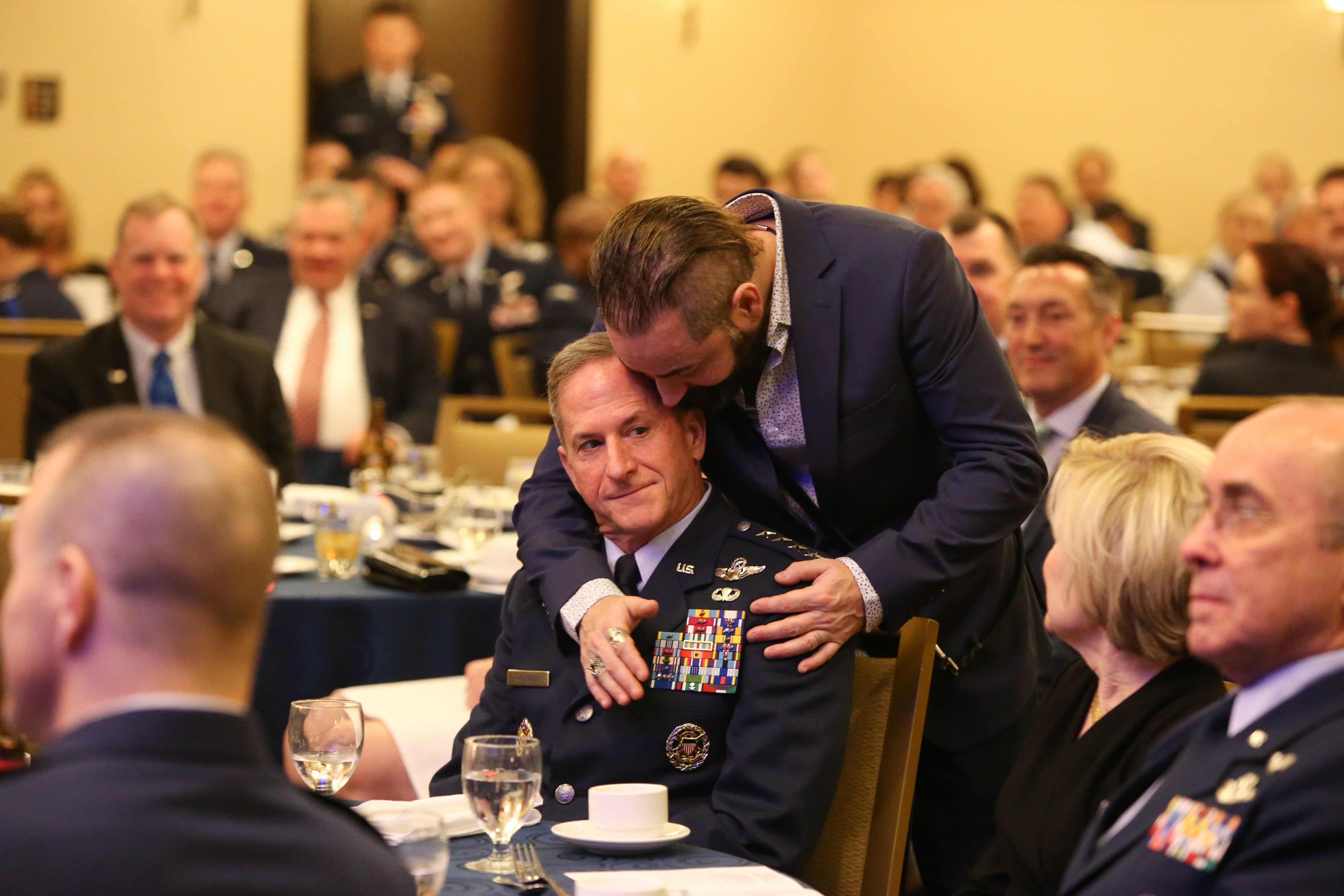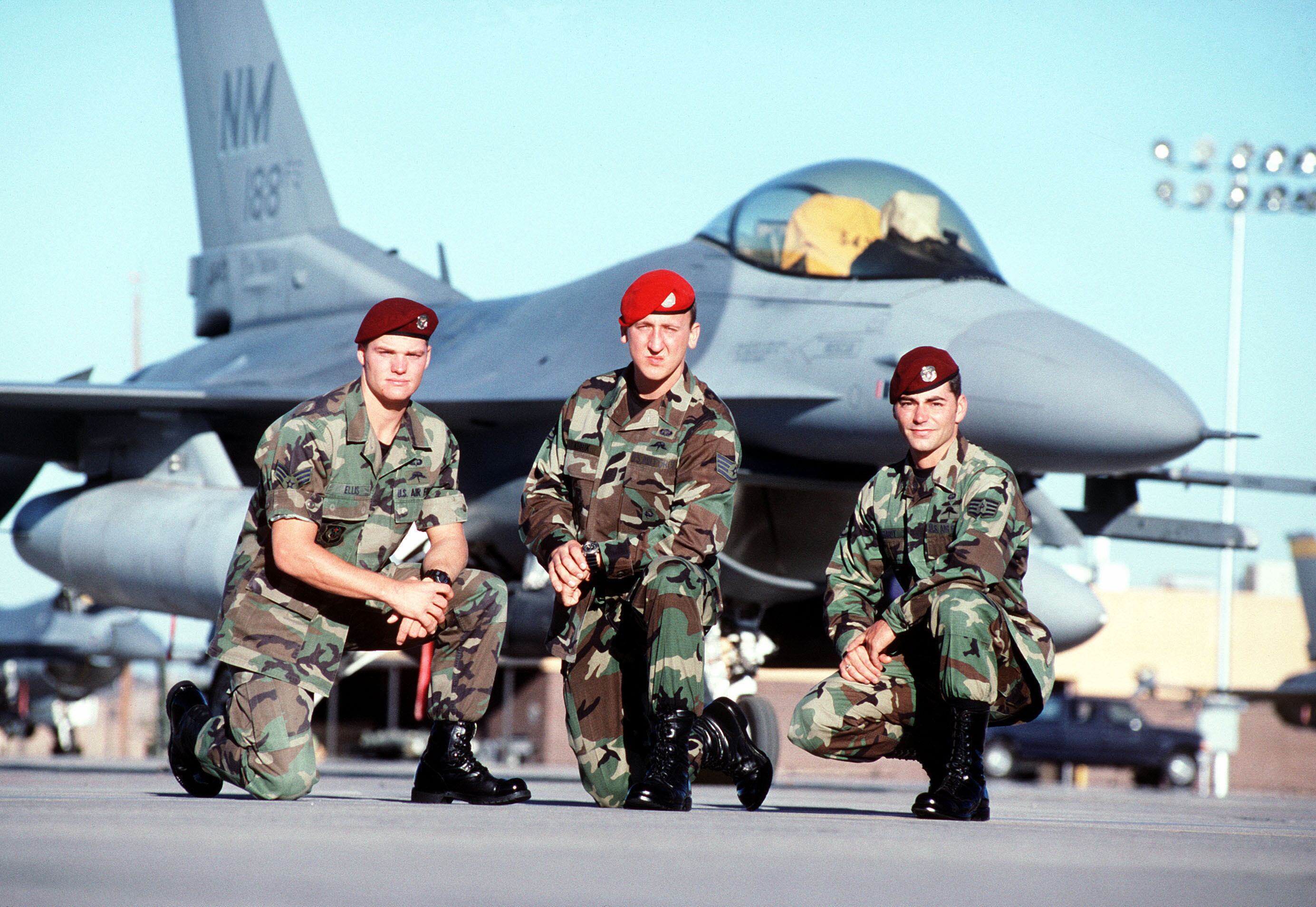It was a harrowing rescue under fire: A three-man team of two pararescuemen and a combat controller flew into enemy territory 20 years ago to save an F-16 pilot who had been shot down over Serbia.
Years later, that endangered fighter pilot would become the 21st chief of staff of the Air Force. And on March 2, Gen. Dave Goldfein received a surprise that showed the bond between himself and those fellow airmen remains as strong as ever.
Retired Chief Master Sgt. Jeremy Hardy, the PJ who led that rescue team on May 2, 1999, reunited with Goldfein at Saturday’s Spaatz Association Mid-Winter Dinner and Awards Gala in Arlington, Virginia.
According to an Air Force release, Army Maj. Lee Chase spoke at that dinner about the importance of relationships, and began telling the story of his friend Hardy, and how he helped save Goldfein. While Chase spoke, the release said, Hardy walked toward Goldfein and revealed himself. A photograph from the event showed Hardy giving Goldfein an apparently unexpected embrace.
“I’ve been the chief for about two and a half years, and this is the best surprise I have ever had,” Goldfein said.
Hardy also embraced Goldfein’s wife, Dawn, and then introduced Goldfein before his keynote address to the dinner.

Goldfein has maintained a deep friendship with Hardy and his teammates — pararescueman Ron Ellis, who was a senior airman at the time of the rescue, and combat controller Andy Kubik, who was a staff sergeant in 1999 — since the rescue. He has often spoken of his admiration for them, and sends a “single malt, good quality” bottle of Scotch to their unit every year. The unit saves the last few drinks of each bottle until Goldfein returns to bring a new one, and they finish the old bottle together.
In a May 2016 interview, after Goldfein was nominated to be chief of staff, Hardy told Air Force Times that Goldfein continued helping him throughout the years. Goldfein officiated Hardy’s chief master sergeant promotion ceremony and his retirement ceremony.
RELATED

And Hardy said that Goldfein helped him out when his post-traumatic stress disorder “hit rock bottom.” The Air Force planned to force Hardy to retire due to his PTSD, while he was serving as the superintendent of the cadet wing at the Air Force Academy. But Goldfein stepped in and made sure he was transferred back to Hurlburt Field, Florida, so he could retire there. Hardy said that was important, because Hurlburt has a tight-knit special operations community and a strong support structure for retired troops suffering from physical and emotional injuries.
Hardy said that was “just one of many” ways Goldfein helped his brothers.
Hardy told Air Force Times that to rescue then-Lt. Col. Goldfein in Serbia, the three-helicopter team had to repeatedly dodge surface-to-air missiles and 40mm Bofors anti-aircraft fire. Hardy, Ellis and Kubik’s MH-60G Pave Hawk was the first to spot Goldfein and landed in a clearing. The three men jumped out and ran toward Goldfein as he emerged from his cover in the woods, while dodging fire from Serbian troops on his tail.

“I could feel the rounds impacting the ground around us,” Hardy said in 2016.
They got Goldfein on the helicopter, and later found five bullet holes in its fuselage. They jumped on top of Goldfein to shield him from fire, since he was without body armor, and were out in less than a minute without any injuries.
The dinner marked the end of the Civil Air Patrol’s legislative week. Chase said that Hardy was a CAP cadet. Hardy also graduated from its pararescue orientation course around the same time as Chase, the Army major said.
Hardy was the first graduate of CAP’s pararescue orientation course to become a pararescue chief.
Stephen Losey is the air warfare reporter for Defense News. He previously covered leadership and personnel issues at Air Force Times, and the Pentagon, special operations and air warfare at Military.com. He has traveled to the Middle East to cover U.S. Air Force operations.





